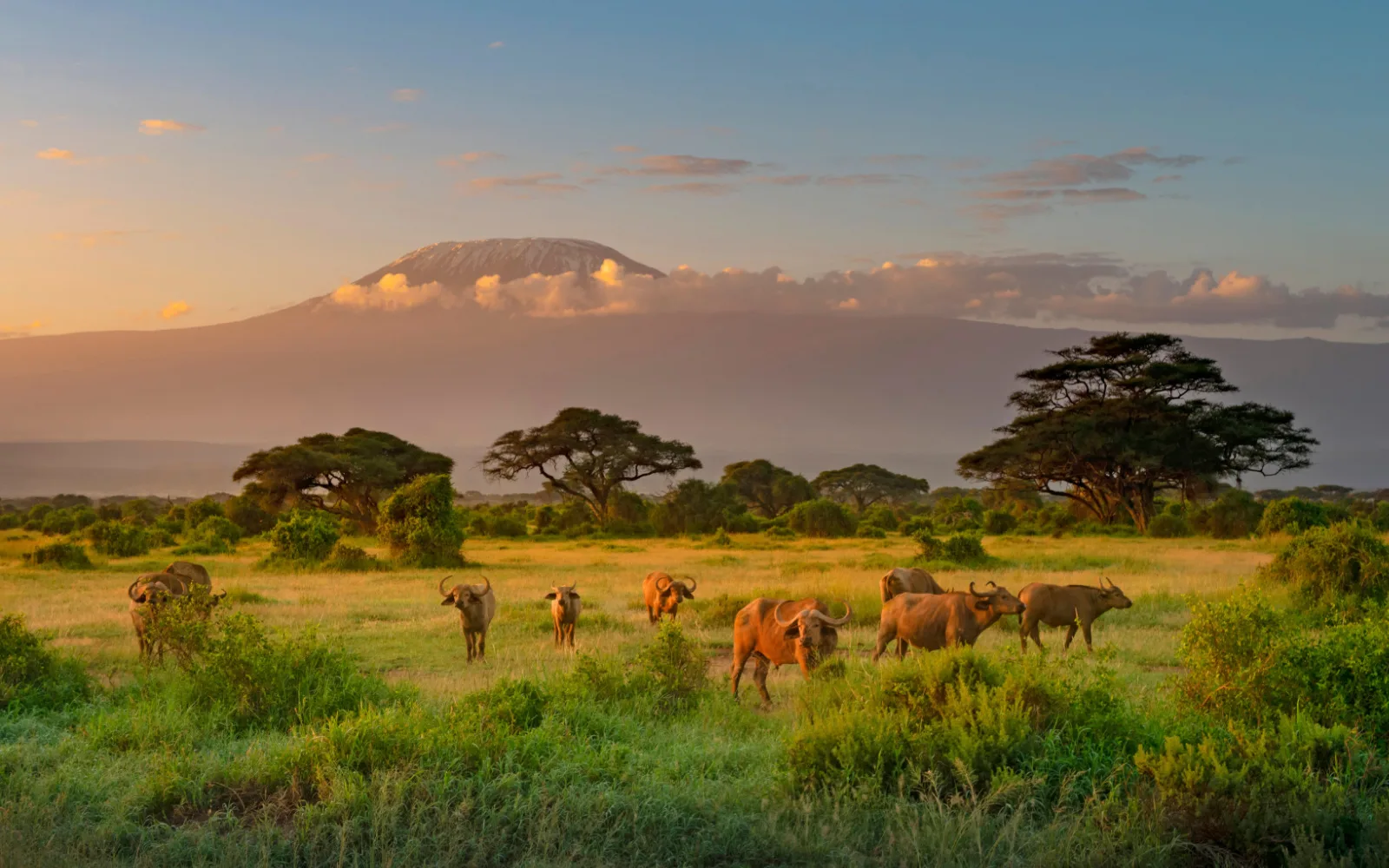The country of Kenya is one of the most popular countries for tourists visiting Africa. About 2 million people visit the country each year.
Kenya is probably most famous as a safari destination, and thousands of people flock to its national parks, such as the Maasai Mara, to see Africa’s big wildlife. However, it has a lot more to offer than just lions and rhinos.
You can also lounge on the pristine sands of Kenya’s Indian Ocean coast and enjoy the unique cultural mix of this region, summit Mount Kenya, or stop in pulsing Nairobi to check out the local nightlife.
Kenya is a dream destination for lovers of nature and wildlife, but many countries that seem like dream destinations turn out to be nightmares in the end. So, is Kenya safe to visit? Here’s our take.
Is Kenya Safe to Visit in 2024?
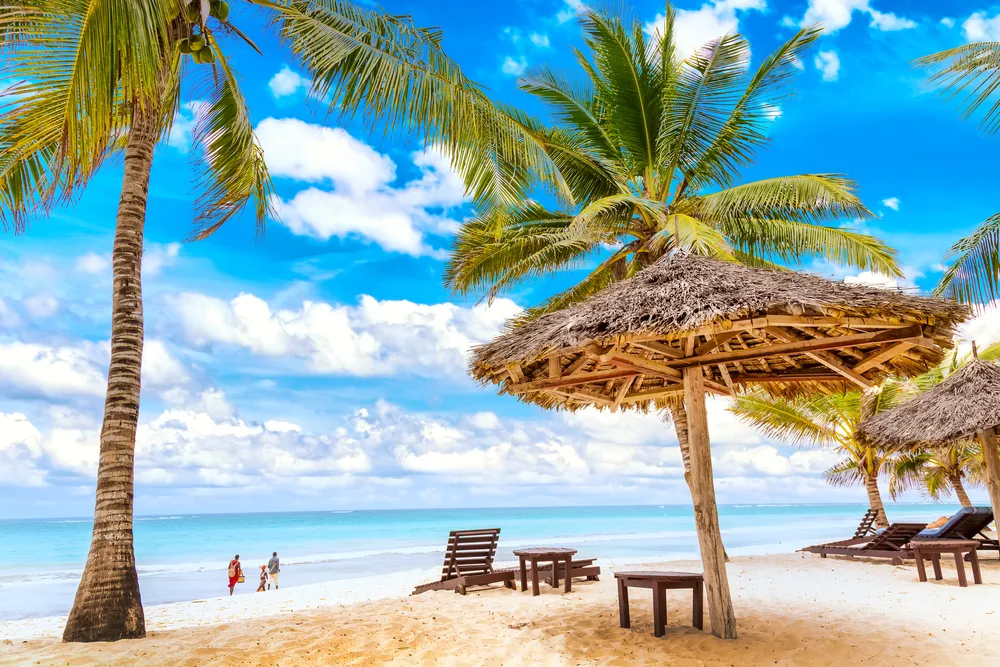
Nick NA/Shutterstock
Yes and no. Kenya has its fair share of problems, including a high violent crime rate and the potential for civil unrest that disturbs many of its cities.
However, it is possible to visit the country safely. You will just have to be careful of which regions you visit and take precautions against crime.
Most governments advise their citizens to exercise increased caution while in Kenya but still say that it is possible to visit the country. For example, the United States places Kenya under a Level Two travel advisory due to the high risk of civil unrest and crime, including violent incidents such as terrorism and kidnapping.
It is true that Kenya, like many East African countries, has a high crime rate. Crimes that occur in the country include:
- Theft
- Robbery
- Carjacking
- Kidnapping
- Assault
Kenya is a country that regularly suffers from civil unrest and political tension. In the summer of 2023, protesters took to the streets, enraged by the high cost of living and government tax hikes many perceived as just adding to the problem. Several people died during the protests.
Due to heightened political tensions within Kenya, protests occur frequently, especially around important dates for the country, such as elections.
They often turn violent due to the government’s increasing crackdown on dissent. Protests are particularly likely in Nairobi, the capital, and other big cities. It’s best to avoid being near any demonstrations, both due to the risk of physical violence and due to the risk of detention if police see you.
The local U.S. Embassy often issues alerts if there are protests or other disruptions planned, so sign up for alerts or look at their page for updates. A lot of the unrest in Kenya isn’t the country’s fault. It’s located in a neighborhood with a lot of ongoing conflict.
Somalia’s civil war has been ongoing for decades, and militias and terrorist groups often spill over the porous Somalia–Kenya border, including the maritime border.
Neighboring South Sudan and Ethiopia are also involved in armed conflict. This instability in neighboring countries sometimes affects Kenya, especially in border regions. If you are headed into nature, you should be aware of the risk of natural disasters.
According to a United Nations report, Kenya is prone to droughts, flooding, and landslides. During the rainy season, heavy rain often causes flooding and landslides in rural areas. Make sure you check the weather report and see if there are heavy storms predicted before setting out on a multi-day trek.
Crime in Kenya
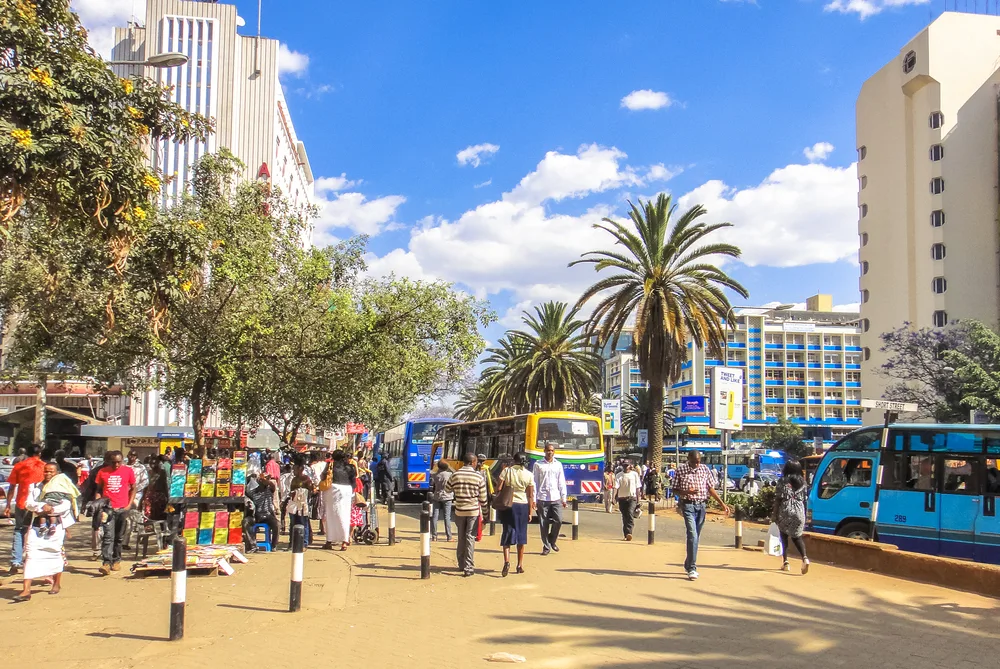
NAIROBI/KENYA – SEPTEMBER 15 2013: Many people on the street of Nairobi in Kenya. Eastern Africa/Authentic Travel/Shutterstock
Kenya has a fairly high crime rate throughout the country. Although it doesn’t have the highest crime rate in the world or even in the region, the crime rate is still high enough to cause concern.
Particularly worrisome is the high violent crime rate. The homicide rate in Kenya is 5.27 incidents per 100,000 people as of 2021. The crime rate has steadily been increasing over the past few years despite crackdowns by security forces.
The Kenyan police offer a statistical breakdown of crimes that occur in their country. Various forms of theft make up about 20% of the overall crime rate. The most common is general stealing, which includes street crimes and shoplifting.
Theft of livestock, theft by servants, and theft of vehicles also make up a generous portion of the overall theft rate. The next most common crime is another nonviolent offense, offenses against morality, which makes up about 10% of total crime rates.
Drug-related offenses make up about 7%. Homicide is the most common violent crime that is separately named. Murders make up a whopping 4% of overall crimes committed in Kenya, which is a fairly high percentage.
The Kenyan police have a separate category, other offenses against persons, which makes up 27.5% of total crimes committed in Kenya. It’s unclear from the statistics what these offenses are, but they probably include other common violent crimes such as assault and sexual assault.
The Kenyan police keep a separate tally of crimes committed against tourists. According to these official statistics, only 31 offenses were committed against tourists in 2021.
This is heartening and shows that tourists are generally safe in the country. However, you shouldn’t take this statistic as a guarantee of safety. The majority of crimes in Kenya go unreported, including crimes against tourists, because people have fairly low trust in the Kenyan police.
Plus, this statistic is from 2021, when travel was still somewhat restricted due to the coronavirus pandemic. The likelihood is that actual offenses against tourists are far more common than the statistics show.
These crime statistics should tell you that crime is definitely something you are right to worry about when visiting Kenya. The country has a high crime rate, including a high violent crime rate, and there is low trust in the ability of authorities to do anything about it.
However, keep in mind that people who are most affected by the high crime rate are people who have to live there, not tourists — and especially not tourists who make sure to take smart precautions as they are out and about!
Robbery
Crimes against tourists are likely in Kenya. They are most likely to be crimes against your property, such as theft, or violent attempts to get your property, also known as robbery.
The UK government warns about the risk of robbery, mugging, and bag snatching in big Kenyan cities, including Nairobi and Mombasa. Criminals often operate around areas where tourists tend to be, such as bus stations, historic centers, or Mombasa’s Likoni ferry terminal.
Be very careful in your movements. Avoid bad parts of town when you head to a new part of Kenya (ask your hotel concierge or other locals for advice on where to avoid walking).
Don’t stroll alone at night — robberies can occur during the day, but they tend to increase after dark. Trust your instincts as you walk. If an area feels sketchy, it probably is.
You don’t want to do anything that draws unnecessary attention to yourself. That means don’t wear expensive jewelry or designer clothing (this is also disrespectful as it shows off the large gap between your income and that of the locals).
Don’t advertise that you have lots of cash on you. A lot of robberies occur while people are in transit. The Canadian government advises visitors to Kenya to only take reputable taxis with prominent markings.
At the airports, only take taxis from official taxi stands as robbers sometimes pose as taxi drivers to get closer to potential victims. For intercity travel, the safest option is to go on organized tours with reputable tour companies.
The most important thing to remember is that your personal safety always comes first. If you do get robbed, hand over your valuables and focus on getting away. There have been cases where tourists were killed in Kenya during robberies gone wrong.
Terrorism
Unfortunately, there is a very real risk of terrorism in Kenya. Many countries, such as Australia, mention it in their travel advisories for Kenya. Most terrorist attacks in Kenya are tied to al-Shabaab, a militant Islamist group which is based in neighboring Somalia.
In August 2023, a group of 60 al-Shabaab terrorists attacked civilians in Kenya’s northern Lamu County. A decade ago, the group attacked the popular Westlake Mall in Nairobi, killing over 60 people.
Today, terrorism is mostly a threat in Kenya’s northern regions, but it can happen anywhere, and groups have announced their intention to target parts of Kenya popular with foreigners.
Stay alert when you are in crowded areas, and head for the exit if you notice a disturbance. Follow local news and make sure that you listen to any security advice given to you by authorities. Besides bombing and deadly attacks, terrorist groups are also behind a spate of kidnappings.
These kidnappings target foreigners, especially aid workers and tourists. Most of these attacks have occurred in the north, near Somalia’s border, so make sure that you avoid this region unless you absolutely must travel there.
Avoiding Bad Areas
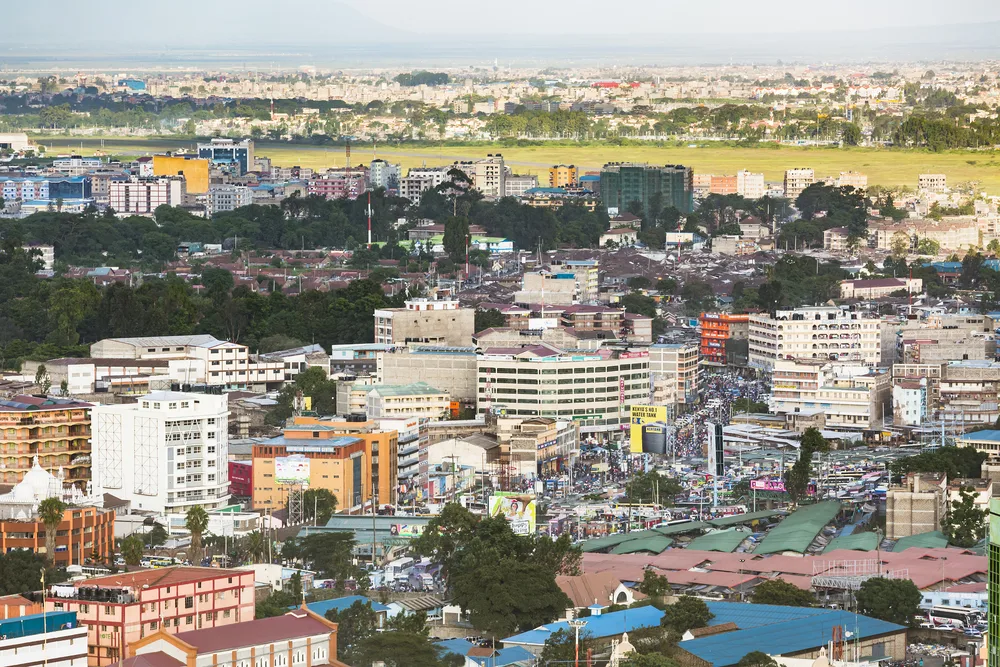
IndustryAndTravel/Shutterstock
There are certain parts of Kenya that aren’t safe to visit. Avoid the border with Somalia due to the high risk of terrorism and armed attacks. For the same reasons, avoid the border regions with Ethiopia and South Sudan.
The northern counties of Lamu, Tanu River, and Kilifi have seen increased terrorist attacks, especially near the coast. Only visit these regions on essential travel.
Nairobi has some dangerous neighborhoods, in particular the shantytowns. Avoid:
- Eastleigh
- Kibera
- Pangani
- Mathare
In Mombasa, the Old Town gets dangerous after dark.
Things to Consider
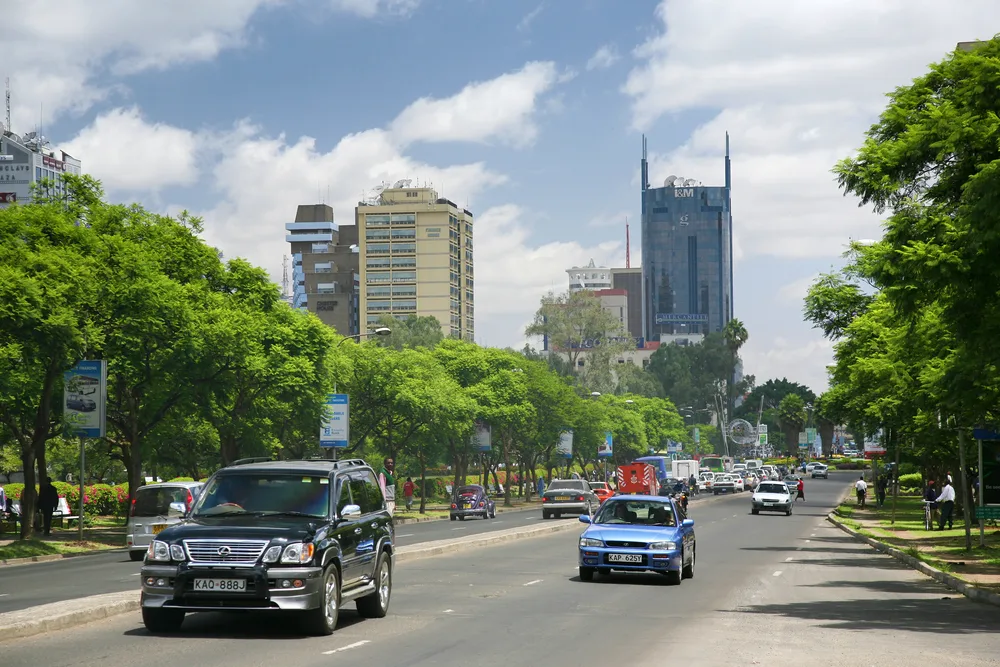
NAIROBI, KENYA, FEBRUARY, 2009: Nairobi, the capital city of Kenya. Africa/SpiritArt/Shutterstock
Here are some additional safety tips for visitors to Kenya:
- Be careful around the animals. If you are going on safari, remember that you are visiting wild animals, not domesticated ones. Do not touch, feed, or get too close to the animals, as humans have been attacked before. Obey any safety instructions from your safari operator, such as staying in the truck or only sticking to marked paths.
- There is a threat of piracy off the Kenyan coast. Avoid sailing or other water-based activities too far away from the coast, as you may get attacked by Somali pirates.
- Always keep your bag on the side of your body away from traffic. Thieves often operate on motorbikes and snatch people’s bags or smash car windows to get at purses.
- Bandits are common on Kenya’s roads. They often target roads leading to major national parks and wildlife reserves. Opt to go with a tour group, if possible, instead of driving by yourself, as professional drivers will know the best way to avoid danger.
Frequently Asked Questions
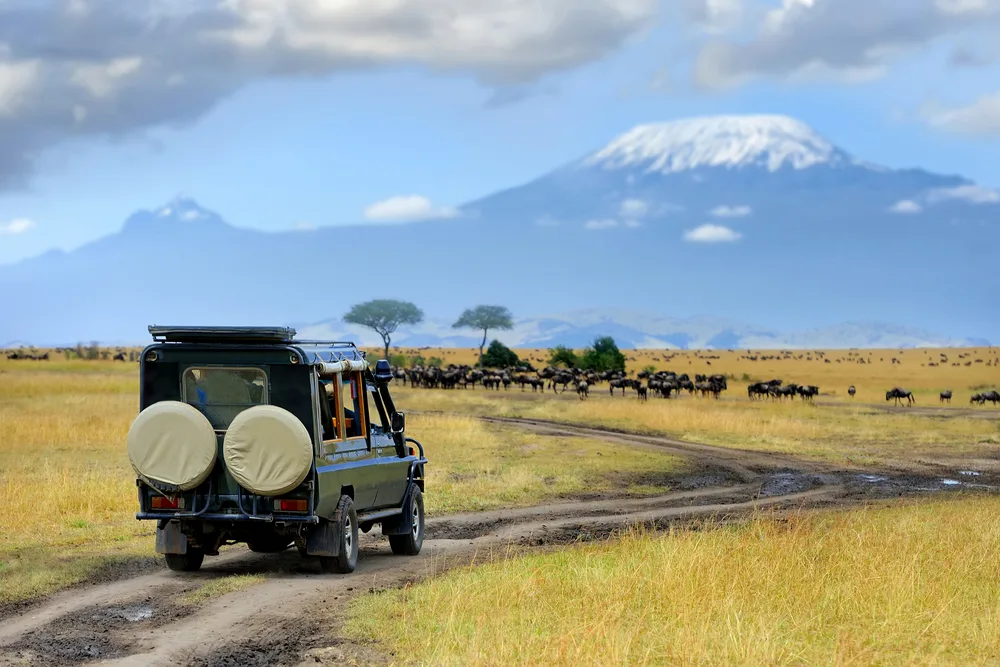
Volodymyr Burdiak/Shutterstock
Here are some common questions about safety people have asked about Kenya before:
Are tourists safe in Kenya?
Tourists are sometimes targeted for crime in Kenya, ranging from kidnapping to petty theft. They are also subject to the same risks that locals are, such as robberies. However, it is possible to visit Kenya safely, and millions of people do so every year. A lot of it comes down to precautions you take as well as luck.
Is Kenya safer than South Africa?
Kenya is safer than South Africa because it has a lower crime rate (South Africa has one of the highest violent crime rates in the world). However, there is a lower risk of terrorism in South Africa.
Is Kenya a good place to go?
Kenya is a spectacular place to go. It has beautiful nature and some of the best safari in the world. If you have to pick one destination in East Africa to visit, it should be Kenya.
Is it safe for tourists to drive in Kenya?
It is possible to drive as a tourist in Kenya — but not recommended. Due to the high rate of crime targeting vehicles and the poor road quality, it’s better to have a local drive you.
Is Nairobi safe for white tourists?
Nairobi is fine to visit for tourists of all skin colors and ethnicities. All tourists should be aware that they avoid dangerous neighborhoods and wandering after dark.
So, Is Kenya Safe to Visit?
Kenya is a country where you will need to avoid moving around after dark, avoid certain regions, and keep a firm grasp on your purse. However, these precautions are worth it because Kenya is a once-in-a-lifetime experience. Happy travels!



